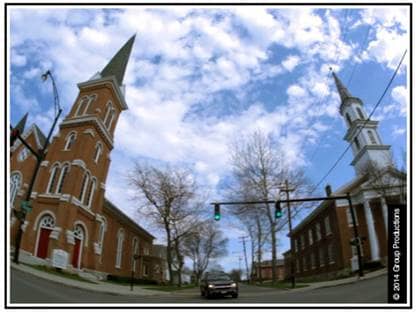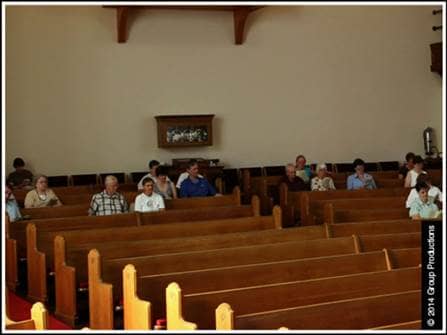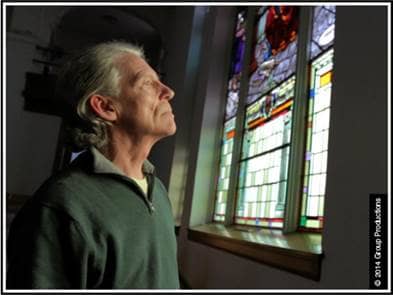“The church, as we know it, is in trouble.” Thom Schultz makes that statement calmly, but there’s fire that burns behind his words. As the founder and president of Group Publishing, he’s spent his entire adult life studying and serving the church. Now he’s ready to sound an alarm. “American church attendance and spiritual vitality are spiraling downward,” he reports. “Congregations’ reaction to this deterioration has often been to deny it, to ignore it, to wish it away, to blame others for it, and to vociferously defend the ‘way we’ve always done it.’”

Using the power of stories, Schultz produced and directed the eye-opening documentary film, When God Left the Building. This movie takes an unblinking look at dying churches—including a once-thriving congregation that’s now fractured and nearly nonexistent, and a pastor who doesn’t know who or what God is. It also checks out innovative new forms of church that are thriving, including a congregation that meets in a pub.
“I want to help reveal what’s happening in the church,” Schultz says, “and to give a peek into some directions that may bring new vitality to the church. The first step is to bring awareness of the issue. This film provides a provocative jolt to ignite conversation. We’ve seen that people really want to talk about it after seeing it.”
Things That Kill a Church
When God Left the Building builds on the research of Schultz’s book, Why Nobody Wants to Go to Church Anymore. Based on his multi-year studies, Schultz has identified the top things that repel people from church:
“First,” he says, “people say they feel judged. They sense a certain rejection that may have to do with their values, their appearance, their lifestyle, or their background. Second, they say they don’t want to be lectured. They see church as a vehicle of one-way communication. They don’t feel the church accommodates their thoughts, questions, and doubts.”
“Third, people say church people are hypocritical—but they’re not just repeating the old complaint. It’s more nuanced today. They’re really saying that church people set themselves up as having all the answers, as know-it-alls. And people who pontificate like that are seen as arrogant and phony.”

According to Schultz’s research, the final reason why churches die is the most tragic:
“People say they don’t find God at church. So, why go? In fact, one study showed that most church-goers don’t typically experience the presence of God in the weekly church service. So, increasingly people say they find God elsewhere, outside the church.
“One man told us about his atheist brother who saw the film, and was particularly moved by the people who were showing the love of Christ outside church walls, out in the real world. The atheist brother said, ‘If that’s what you’re really about, I might be willing to take another look at your faith.’” Thom Schultz thinks that guy might be onto something.
Things That Give Life to Your Church
“To a culture that feels judged by church people,” Schultz says, “we need to offer Radical Hospitality. Jesus built a reputation around loving and accepting those who felt judged by the religious elite—tax collectors, prostitutes, adulterers. Jesus didn’t endorse their every behavior, but he accepted them and welcomed them. That’s Radical Hospitality.
“Next, instead of merely lecturing people, the church can engage in Fearless Conversation, allowing for two-way communication, questions, and doubts. Here’s an example from my church. A sermon may begin with a few minutes of lecture, then the pastor asks a great question and encourages people to turn to someone next to them to answer it. It’s interactive and fearless, demonstrating that we’re not afraid to talk about what people really want to talk about.”
“To blunt the reputation of hypocrisy, we advocate Genuine Humility,” Schultz continues. “Rather than emitting an aura of ‘I’ve got it all together,’ we need to project a sense of ‘We’re all in this together.’
“We are on a journey of faith. None of us has arrived. We all struggle. We don’t have all the answers. But together, as a community of faith, we can follow the One who does have the answers. (And, to be clear, I’m not referring to ‘the One’ as your celebrity pastor!)”
“Fourth, we encourage something we call Divine Anticipation. Quite simply, this means we actively look for all the ways God is active in our lives today. We need to make time, at church, for people to share how they’ve seen God work in the past week. And the church needs to allow time for God to act in its weekly gatherings. Rather than stiffly programming every moment in a worship service, we need to allow some good time for reflection, for listening to God, and for experiencing God’s presence through some poignant experiences.”
This, Schultz feels, would turn the tide on the current situation. When people encounter God intimately and personally, their lives are changed. Who wouldn’t want to come to a church where that happened regularly?
Still, making the kinds of changes Schultz advocates doesn’t happen easily—or often. Even faced with staggering decline, churches just keep doing what they’ve always done. Why? Schultz points to a “phenomenon of paralysis.”
“Most churches are stuck in a methodology of ‘how we’ve always done it.’ And even when they recognize the need to make some changes, they’re crippled with fear. So they do nothing. To counteract the church’s state of paralysis, I think the church needs to heed Scripture’s repeated command: ‘Fear not!’ If we are people of faith, we need to exhibit some faith. We need to step out and try some new approaches. Do something!”
Is There Hope?
“Sometimes people ask if I’m hopeful about the future of the church,” Schultz says in closing. “I am hopeful! But I need to qualify that. The church in its original definition is the Body of Christ, a community of believers. I’m hopeful about that church. But that’s quite different from the institutionalized church we’ve come to know. The vibrant church of tomorrow will look quite different from the church we see today.
“Many people find real hope and encouragement for the future in the unique ministries shown in this film, When God Left the Building. They see that God isn’t confined only to some building on Sunday morning, but he’s at work through the lives of enthusiastic members every day of the week—out in the real world.”


